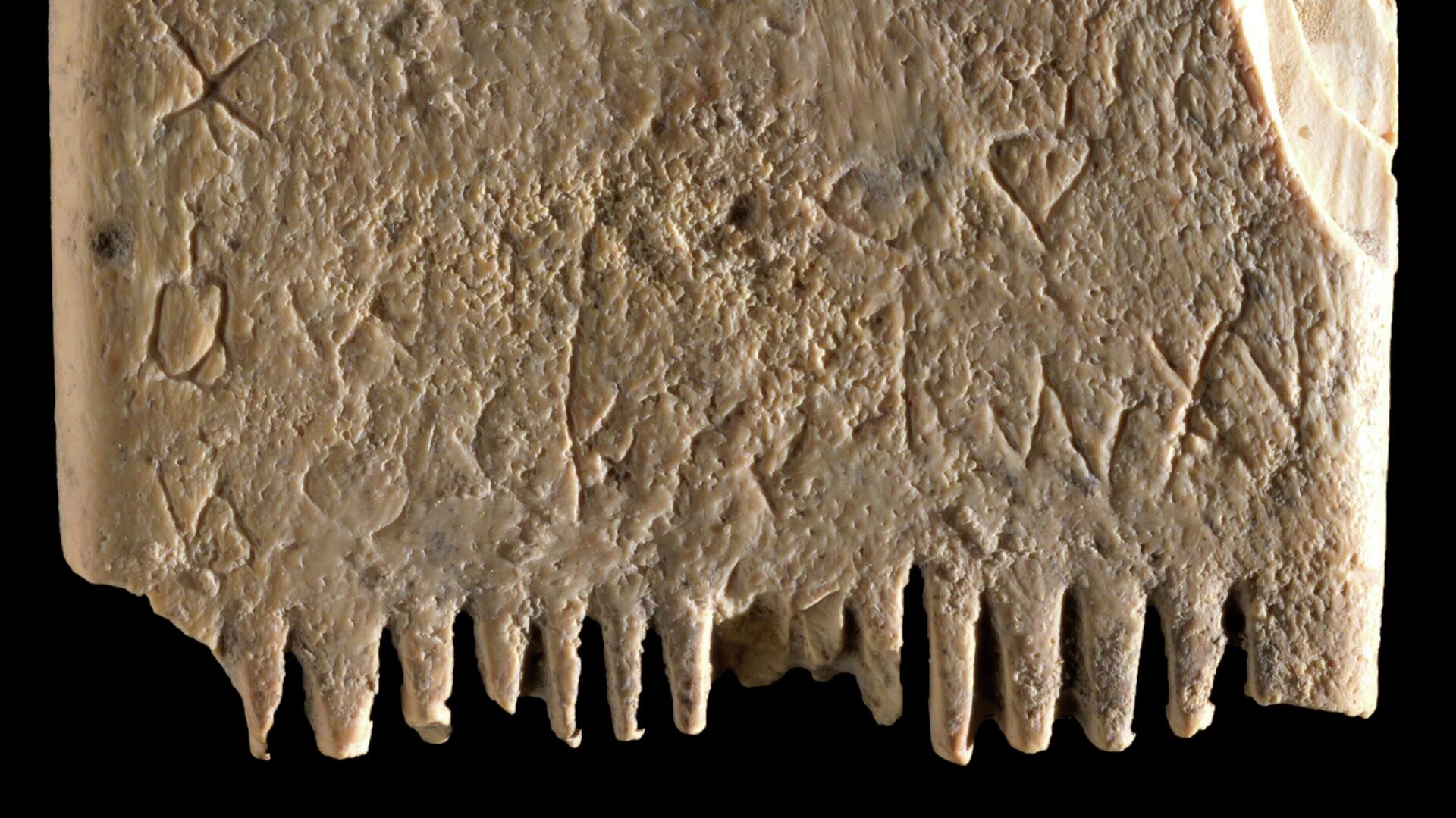https://sputnikglobe.com/20221109/it-is-a-very-human-text-archeologist-discover-oldest-sentence-written-in-ancient-alphabet-1103955335.html
'It Is a Very Human Text': Archeologist Discover Oldest Sentence Written in Ancient Alphabet
'It Is a Very Human Text': Archeologist Discover Oldest Sentence Written in Ancient Alphabet
Sputnik International
The Canaanites spoke an ancient Semitic language, which is related to our modern forms of Hebrew, Arabic, and Aramaic. It is believed they created the first... 09.11.2022, Sputnik International
2022-11-09T23:05+0000
2022-11-09T23:05+0000
2023-01-15T17:27+0000
archaeology
discovery
ancient
world
israel
https://cdn1.img.sputnikglobe.com/img/07e6/0b/09/1103930635_0:410:2907:2045_1920x0_80_0_0_9cf542a552fe774e82cde142dc181470.jpg
Israeli archaeologists have discovered the first known complete sentence written in ancient Canaanite script.The discovery came after a Hebrew University noticed the script on a comb that was discovered in southern Israel in 2016. Previously, no one noticed the ancient script on the comb.The Canaanite script is thought to have been invented around 1800 B.C. Previous finds from that period were limited to a few letters or a word. This comb was the first to be discovered with a complete sentence and gives us some insight into how ancient Canaanites lived.The ivory comb was found in the ancient city of Tel Lachish, in the city’s palace and temple district. Garfinkel says this may show that literacy was limited to wealthy Canaanites.The find shows they may have been more advanced in their written language at that time than previously thought. “It shows that even in the most ancient phase there were full sentences,” Garfinkel said.However, carbon dating was inconclusive on the comb. Experts dated it to 1700 B.C. by comparing it to Canaanite alphabet scripts found in Egypt’s Sinai desert dating between 1900 B.C. and 1700 B.C.Because of that, Australian archaeologist Felix Höflmayer, who was not part of the study, says the evidence is too scarce to date the object. “There are just not enough securely dated early alphabetic inscriptions currently known,” he said.Still, Höflmayer agrees that any discovery with this much ancient Canaanite script is a significant find. “Seventeen letters preserved on a single object is definitely remarkable,” he added.
israel
Sputnik International
feedback@sputniknews.com
+74956456601
MIA „Rosiya Segodnya“
2022
News
en_EN
Sputnik International
feedback@sputniknews.com
+74956456601
MIA „Rosiya Segodnya“
Sputnik International
feedback@sputniknews.com
+74956456601
MIA „Rosiya Segodnya“
archaeology, discovery, ancient, israel
archaeology, discovery, ancient, israel
'It Is a Very Human Text': Archeologist Discover Oldest Sentence Written in Ancient Alphabet
23:05 GMT 09.11.2022 (Updated: 17:27 GMT 15.01.2023) The Canaanites spoke an ancient Semitic language, which is related to our modern forms of Hebrew, Arabic, and Aramaic. It is believed they created the first alphabetic language.
Israeli archaeologists
have discovered the first known complete sentence written in ancient Canaanite script.
The discovery came after a Hebrew University noticed the script on a comb that was discovered in southern Israel in 2016. Previously, no one noticed the ancient script on the comb.
“May this tusk root out the lice of the hair and the beard,” the 17-character inscription has been translated as saying.
The Canaanite script is thought to have been invented around 1800 B.C. Previous finds from that period were limited to a few letters or a word. This comb was the first to be discovered with a complete sentence and gives us some insight into how ancient Canaanites lived.
“It is a very human text,” the lead researcher, Hebrew University archaeologist Yosef Garfinkel said. “It shows us that people didn’t really change, and lice didn’t really change.”
The ivory comb was found in the ancient city of Tel Lachish, in the city’s palace and temple district. Garfinkel says this may show that literacy was limited to wealthy Canaanites.
The find shows they may have been more advanced in their written language at that time than previously thought. “It shows that even in the most ancient phase there were full sentences,” Garfinkel said.
However, carbon dating was inconclusive on the comb. Experts dated it to 1700 B.C. by comparing it to Canaanite alphabet scripts found in Egypt’s Sinai desert dating between 1900 B.C. and 1700 B.C.
Because of that, Australian archaeologist Felix Höflmayer, who was not part of the study, says the evidence is too scarce to date the object. “There are just not enough securely dated early alphabetic inscriptions currently known,” he said.
Still, Höflmayer agrees that any discovery with this much ancient Canaanite script is a significant find. “Seventeen letters preserved on a single object is definitely remarkable,” he added.




